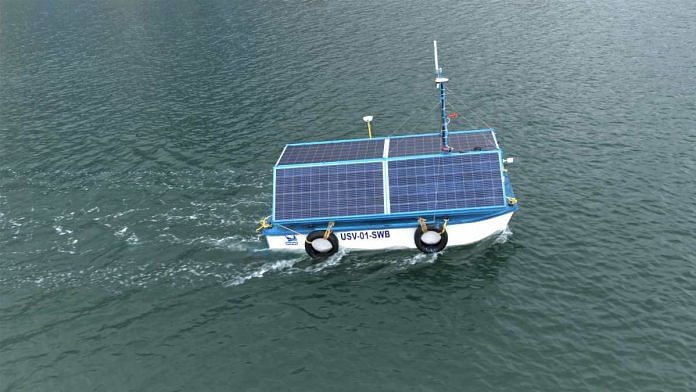Bengaluru: Engineers at the Indian Institute of Technology (IIT), Madras, have developed a novel solar-powered vehicle to survey India’s water bodies.
The autonomous robotic vehicle can undertake hydrographic and oceanographic surveys, while providing real-time data about its environment.
The vehicle captures precise depth measurements in both deep and shallow waters of all shapes. It is equipped with echo sounder for depth measurements, an onboard GPS system for tracking, 360-degree view camera, and Light Detection and Ranging (LiDAR) for topographical measurement.
It also has provisions to carry additional engineering and technical payloads, with the ability to also measure incoming and passing water currents in the future.
The craft was developed by a research team at National Technology Centre for Ports, Waterways and Coasts (NTCPWC), the technology arm of the Ministry of Shipping, in IIT-Madras, and the IIT-Madras Incubation Cell. The NTCPWC works in collaboration with IIT-Madras.
The institute is already in the process of commercialising and licensing this technology with the help of the ministry. The vehicle is expected to be operational in early 2021.
The development of this automatic survey vehicle is said to be a big step forward towards making India’s maritime sector, currently dominated by both foreign tech and services, indigenous.
“This is a significant leap towards indigenisation of the Indian maritime sector, which is currently dominated by foreign technology,” said K. Murali, Head of Department of ocean engineering at IIT-Madras.
“The craft is capable of delivering precise and accurate depth measurements even in very shallow waters. This autonomous survey craft will help to meet the increasing demands for volume and efficiency as ships are becoming larger, with maximum loading to ensure most efficient operations,” he added.
Also read: Technology companies should slow rush to mine the deep seas
Team spent 6-8 months on development, testing of vehicle
The research team, for two years, investigated the means to bring in automation in the port and shipping sector, and spent six to eight months on the development and testing of the vehicle.
The vehicle, which measures 4.5mx3m with a double hull, would be available to port authorities for use, along with accompanying services from the NTCPWC if needed.
“Ports like the ones in Cochin and Kolkata require constant monitoring to facilitate safe passage of ships,” explained Dr D. Kumaran Raju, principal scientist, NTCPWC, to ThePrint.
“These survey boats carry out necessary measurements needed for the process, and these autonomous vehicles can make the process much quicker, without hindering passing ships that would otherwise require clearing the way,” he added.
Bathymetry, or the measurement of depth, is especially important in narrow ports where tides bring in large amounts of sediments and deposits as they come in each time.
The port in Kolkata, for example, conducts bathymetric surveys every 15 days, said Raju, and these autonomous vehicles are expected to likely function there first commercially after planned demonstrations over the next few days.
Also read: Kerala is pulling plastic from the oceans to build roads



